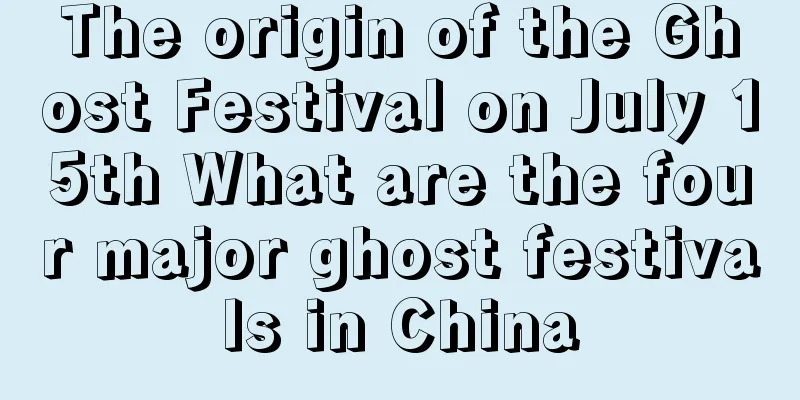The origin of the Ghost Festival on July 15th What are the four major ghost festivals in China

|
The Mid-July Festival generally refers to the Ghost Festival. Zhongyuan Festival is the name of Taoism. It is commonly known as the ancestor worship festival on the 15th or 14th day of the seventh month (another saying is the 15th day of the seventh month) in folk culture. It is called the Yulanpen Festival in Buddhism. So, what is the origin of the Ghost Festival on July 15th? What's the story? The Origin of the Ghost Festival on July 15th The Ghost Festival on July 15 is also known as the Ghost Festival. This Ghost Festival is also the largest and most expensive of the many Chinese festivals. The Zhongyuan Festival is also the Buddhist "Yulan Festival". The Mid-Autumn Festival originated from the belief in the dead, ancestor worship and the story of Mulian saving his mother. "All things come from heaven, and man comes from his ancestors." Offering sacrifices to heaven and ancestors became the two major tasks of ancient religious life. For common people, their ancestors are connected to them and they share emotional connections with them, so ancestor worship is particularly meaningful. The Mid-Autumn Festival developed on the basis of the ancient autumn sacrifice customs. Legends of the Ghost Festival The 15th day of the seventh lunar month is the biggest festival in the underworld, Ghost Festival, also known as the Zhongyuan Festival or Yulan Festival. It is one of the three important festivals in the underworld in my country. There is a folk legend that the Lantern Festival is celebrated in the world of the living and the Ghost Festival is celebrated in the underworld. It is said that on that day the King of Hell will also dress in his best attire to celebrate the festival with the ghosts, and ask us living people to bless them together, wishing the people in another world all their wishes come true, and happily enjoy the happiness that they didn't have time to enjoy in the human world. Therefore, many places in our country will hold activities such as sacrifice, visiting Buddha, cleaning tombs, looking back, appreciating flowers, fishing, etc. to celebrate. The Ghost Festival originated from the story of Mulian saving his mother: "There was a monk named Mulian, who had great magical powers. His mother fell into the realm of hungry ghosts. When food entered her mouth, it turned into flames. She was starving and suffering. Mulian was unable to save his mother, so he sought advice from the Buddha, who taught him the Ullambana Sutra and taught him to make a Ullambana on the fifteenth day of the seventh lunar month to save his mother. It is said that after Mulian had experienced untold hardships in the underworld, he saw his dead mother Liu and found that she was being tortured by a group of hungry ghosts. Mulian wanted to use a bowl to serve her vegetables and rice, but the hungry ghosts took it away. Mulian had no choice but to ask the Buddha for help. The Buddha was moved by Mulian's filial piety and gave him the Ullambana Sutra. According to the instructions, Mulian used the Ullambana basin to serve precious fruits and vegetarian food to his mother on the fifteenth day of the seventh lunar month. The starving mother finally got food. In order to commemorate Mulian's filial piety, Buddhists hold a grand "Ullambana Festival" every year, which is what we now call the "Ghost Festival." Taoism also has the theory of "Three Officials and Three Yuans", and designated May 15th, July 15th, and October 15th as the upper, middle, and lower Three Yuans, which are the birthdays of the Heavenly Official, the Earthly Official, and the Water Official respectively. It becomes the Three Yuan Festival in which the Heavenly Official bestows blessings, the Earthly Official forgives sins, and the Water Official relieves disasters. As a result, the 15th day of the seventh lunar month became a common festival for monks, Taoists and laymen. This festival is also connected with Confucianism. Confucianism emphasizes filial piety. When parents are alive, children should personally serve them; when parents die, they should also "offer sacrifices to them as if they were still alive", just as they would when they were alive. Therefore, Confucianism advocates that in addition to offering sacrifices to ancestors twice in spring and autumn, one can also offer sacrifices to ancestors on the 15th day of the seventh month. In this way, the Mid-Autumn Festival marks the confluence and integration of Buddhism, Taoism and Confucianism. In the concept of ancient Chinese, heaven and earth are not absolutely opposed. There are people and many other animals and plants between heaven and earth. Therefore, between those who go to heaven and those who go to earth, there should be some wandering ghosts who have not found a home for various reasons. So, on the 15th day of the seventh lunar month, while people worship their ancestors and show filial piety to their mothers, they will not forget those wandering ghosts who have no whereabouts. People will also worship the wandering ghosts on this day. Over time, a cultural tradition of respecting orphans was formed among the people. What are the four major ghost festivals in China? Ghost Festival, as the name suggests, is a festival related to ghosts and a festival to worship ghosts. Ghosts are an extension of life during the period of human ignorance. Eastern and Western cultures have slightly different concepts about the extension of life, but the idea that people become ghosts after death has always been the mainstream of ghost culture. In some places in our country, March 3rd, Qingming Festival, Zhongyuan Festival and Cold Clothes Festival are collectively referred to as the "Four Major Ghost Festivals". Legend has it that ghosts appear on this day. At night, every household sets off firecrackers in every house to scare away the ghosts. Western ghost festivals include the Mexican Ghost Festival, but the most famous one is Halloween. Other legends of Chinese Ghost Festival Legend of Qingming Festival: According to legend, during the Spring and Autumn Period and the Warring States Period, Prince Chong'er of Jin fled into exile to avoid disaster. Chong'er fainted from hunger. In order to save Chong'er, Jie Zitui cut a piece of meat from his leg, roasted it over the fire and gave it to Chong'er to eat. Nineteen years later, Chong'er returned to his country and became the monarch, Duke Wen of Jin, one of the famous Five Hegemons of the Spring and Autumn Period. After Duke Wen of Jin came to power, he rewarded his ministers who had shared his hardships, but he forgot Jie Zitui. Someone spoke up for Jie Zitui in front of Duke Wen of Jin. Duke Wen of Jin suddenly remembered the old incident and felt guilty. He immediately sent someone to invite Jie Zitui to the court to receive rewards and official titles. Jie Zitui didn't want to see him, and had already hidden in Mianshan with his mother on his back. So, someone came up with an idea and said, why not set fire to the mountain, ignite it on three sides and leave one side, and when the fire started, Jie Zitui would come out by himself. Duke Wen of Jin ordered the fire to be set on the mountain. Unexpectedly, the fire burned for three days and three nights. After the fire was extinguished, Jie Zi was never seen. When they went up the mountain, they saw that Jie Zitui and his mother were already dead, hugging a burnt willow tree. Duke Wen of Jin looked at Jie Zitui's body and cried and bowed for a while, and then buried the body. The next year, Duke Wen of Jin led his ministers to climb the mountain in plain clothes to offer sacrifices and express condolences. When I arrived at the grave, I saw that the old willow tree had come back to life, with thousands of green branches swaying in the wind. After the sacrifice, Duke Wen of Jin named the resurrected old willow tree "Qingming Willow" and designated this day as Qingming Festival. The legend of Cold Clothes Festival: There are many different stories about the origin of the "Cold Clothes Festival". The most classic one comes from the folk story legend of "Meng Jiangnu". According to legend, Meng Jiangnu's husband was captured and forced to perform labor to build the Great Wall just after her marriage. As autumn turned to winter, Meng Jiangnu traveled thousands of miles, enduring many hardships, to bring clothes to her husband to keep him warm. Unexpectedly, her husband died of exhaustion on the construction site and was buried inside the city wall. Meng Jiangnu was so grief-stricken that she cried out to the sky, moving heaven so much that she collapsed a 40-mile-long Great Wall. She eventually found her husband's body by biting her finger to let the blood penetrate into the bone, and then reburied him using the cotton clothes she had brought with her. This gave rise to the "Cold Clothes Festival". Next to the Great Wall Village in Changqing District of Jinan City, there is the Hongshi River where Meng Jiangnu committed suicide after crying down the Great Wall (this river was not called Hongshi River in the past, but because the water turned red after Meng Jiangnu jumped into the river, the river was renamed Hongshi River). The local legend of Meng Jiangnu is supported by inscriptions unearthed in modern times and word of mouth among the people. Before 1958, there was a Meng Jiangnu Temple in the village. It is a pity that the Meng Jiangnu Temple was destroyed during the Cultural Revolution. Not a single tile was left of the temple. Fortunately, someone in the village later found a stone tablet with historical value. The legend of March 3: March 3rd is the legendary Ghost Festival, which is popular in the Jianghuai area, especially in Xinyang, Fuyang and Huainan. Legend has it that on the third day of the third lunar month every year, the boundary between yin and yang, life and death, becomes more relaxed. That night, the streets of the underworld were decorated with lights and colorful decorations, and the streets and alleys were crowded with gorgeous ghosts. Dragon lanterns, lion dances, stilts and flower boats can be seen everywhere. The bustle and prosperity are incomparable to the Spring Festival on earth. Therefore, on this night, people's souls can't withstand the temptation of the underworld and go to the ghost market to play. Some of them wander the streets and alleys watching lanterns and plays; some drink and listen to music in restaurants and teahouses; some take the opportunity to visit their ancestors whom they have never met. When the roosters crow and the ghost market closes, most of the wandering souls return to their bodies contentedly. A few wandering souls were so happy that they forgot to return and stayed in the underworld. The next day, there was crying in the world of the living. We invite monks and Taoists to chant sutras and draw talismans to summon the souls of those relatives whose spirits have not returned. The heart-wrenching cries of relatives and the scriptures and incantations of monks and Taoists can call back some wandering souls that are not playful. Some of the playful ones will leave the world forever after their bodies rot after seven days. Therefore, the third day of the third lunar month became a day of terror and anxiety in the world and was called "Ghost Festival". No matter how scared people are, the "Ghost Festival" on March 3rd every year still comes as usual. On the eve of the "Ghost Festival", people flock to temples to burn incense and kowtow, praying for blessings from gods and Bodhisattvas. The strong incense from the human world rushed straight to the lotus seat of Guanyin Bodhisattva. The Bodhisattva counted with his fingers and knew the reason why people burned incense in the world. One night, she appeared in a dream to an old lady: "I am the Bodhisattva Guanyin of the South China Sea. I know that people on earth are in trouble, so I have come to save you. I will give you a magical grass. Mix it with flour to make cakes and eat them. You will be safe on the third day of March." When the old lady woke up, she was holding a green grass in her hand. Upon closer inspection, it was the same as the Artemisia annua growing in the field. She told the villagers about Guanyin's dream in which she gave them the grass. Everyone was very happy and busy picking Artemisia annua in the fields and grinding it into flour to make cakes. Strangely enough, anyone who ate mugwort cake on March 3rd safely passed the "Ghost Festival". The news soon spread everywhere, and on the eve of March 3rd every year, girls and women would go to the mountains in groups to pick Artemisia annua to make cakes. Until now, people in Shucheng and Huoshan still have the custom of eating mugwort cakes on March 3rd. |
Recommend
Horoscope: Susan Miller's Leo Horoscope for June 2016
All work and no play can make Leo lack creativity...
Are Cancer women and Leo men compatible? They have different views on love and life.
Are Cancer women and Leo men compatible? Cancer w...
Futu Tower weekly zodiac fortune detailed explanation 2018.3.19-3.25 A steady week
Advice for this week: Friends who are born in the...
Characteristics of Gemini If I could choose, I would still like to be a Gemini in my next life!
Many people say bad things about Gemini, such as ...
The Qingming holiday arrangement is also a rip-off. In fact, there is only one day off.
The Qingming Festival holiday is scheduled from A...
Is it good or bad to dream about blood?
Dreaming is a normal physiological phenomenon whe...
Will Libra women ignore people? The reason why Libra women ignore people
Will Libra women ignore people? Libra women are a...
Gemini's love fortune in September 2011
Know in advance the love fortune of Gemini in Sep...
List of auspicious days and times for May 11, 2018
Is May 11, 2018 an auspicious day? How about gett...
Nice girl names with the surname Luo
Nowadays, many parents have realized that giving ...
Is it good for a dog to be born in April? The owner will have a lucky star shining on him throughout his life.
Is it good to be born in April in the Year of the...
Is it okay to move into a new house in 2022, the year of your birth? What are the rules and taboos for moving?
Moving is a big deal for anyone. After moving, ma...
Susan Miller's Aquarius Horoscope for November 2018
The month begins with a beautiful astrological as...
Is February 6, 2022 an auspicious day? A list of auspicious and unlucky times on February 8, 2022
Since ancient times, people have been accustomed ...
Lucky colors for the tiger in 2017: Wear black to attract wealth in the year of the tiger and chicken
Zodiac Tiger: The earthly branch is Yin, the five...









